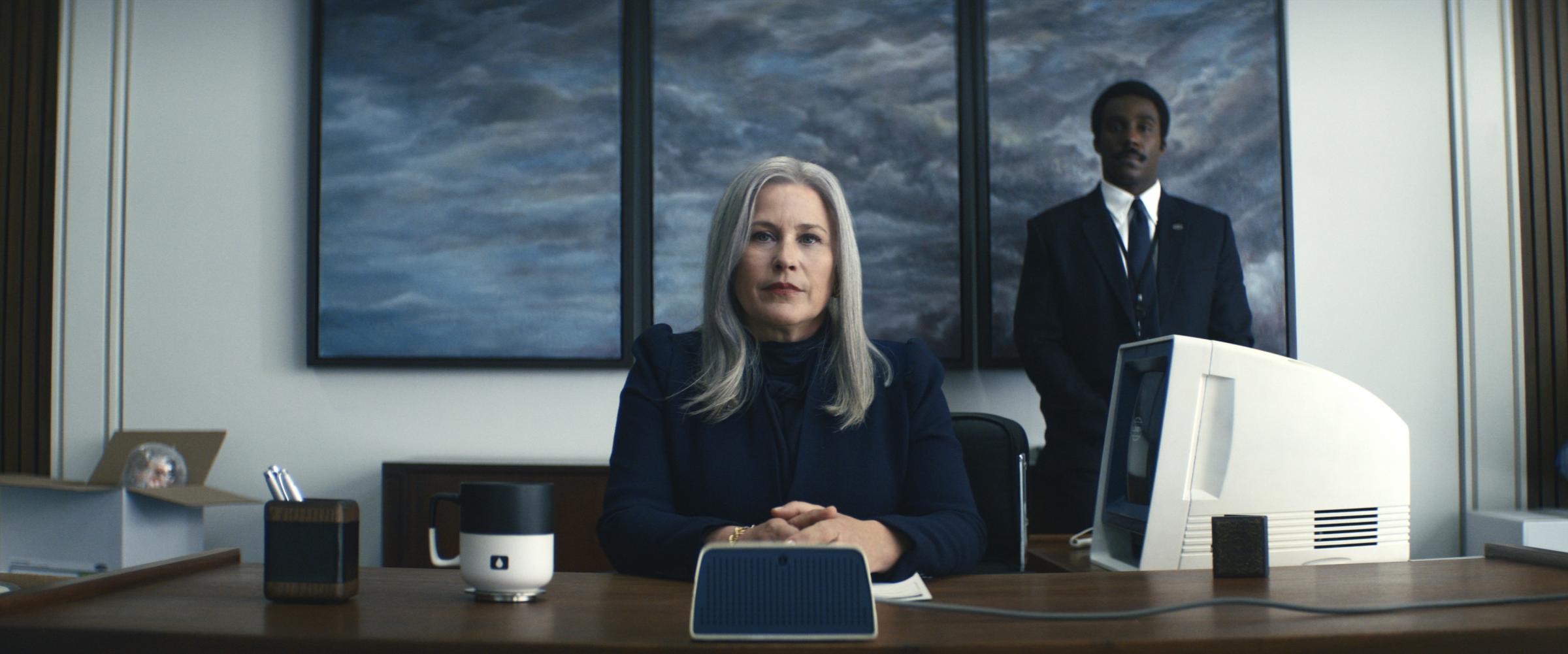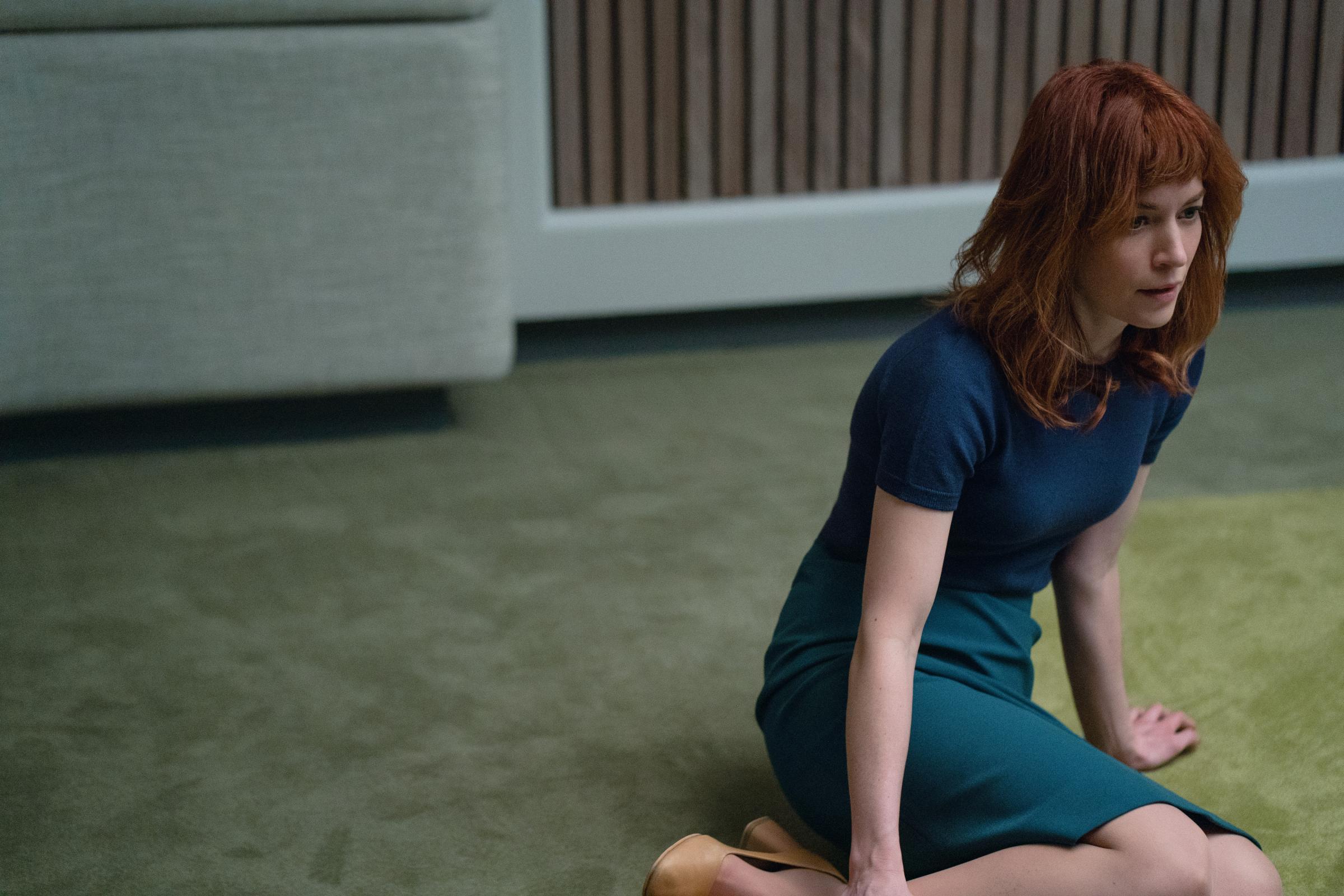Severance, a new psychological thriller from Apple TV+, opens with an image that is at once arresting and alarming. A young, red-haired woman, dressed for the office, lies prone on a conference table surrounded by empty chairs. “Who are you?” a male voice asks, over a crackling intercom. Hoisting herself off the table, the woman stumbles, as though drunk or drugged. We can see that the institutional room she’s in has no windows. She bangs on doors: all locked. The voice politely insists on administering a survey. As he proceeds with the questions, the woman is horrified to realize that she has no idea who she is, where she is, or what’s happening to her.
As her confusion escalates, the show starts revealing itself to viewers. Nightmarish scenario? Check. Bland corporate backdrop? Check. Harsh lighting? Check. Stylized dialogue? That too. Yes, Severance, which premieres Feb. 18 on Apple TV+, is another one of those sci-fi series infused with mind-bending—if often oversimplified—ideas about the intersection of technology, capitalism, and free will. See also: Westworld, Made for Love, Peacock’s Brave New World adaptation, the British and American versions of Utopia, the TNT adaptation of Bong Joon-ho’s Snowpiercer, and too many more to mention. Inspired by the memeification of thoughts so deep they’re shallow (or so shallow they’re deep) and borrowing liberally from social media, I call them galaxy-brain shows. And Severance is the rare example that delivers on its lofty premise.
Set in a snowy parallel universe (or perhaps near-future), the show centers on Lumon Industries, an all-American megacorp overseen by a family dynasty that dates back to a supposedly benevolent philosopher-founder in the mold of Henry Ford or Andrew Carnegie. In recent years Lumon has pioneered a procedure known as severance, which allows the company to split employees’ consciousness for the purposes of conducting top-secret work. After they consent to having an implant placed in their brains, “severed” staffers essentially become two people. While they’re still the same person they always were outside of office hours, their second self exists only at Lumon. Neither half retains any memory of the other’s life. “Outies” wonder, with increasing anxiety, what their “innie” does at work; innies speculate on the very basics of who their outie is.

Our requisite everyman protagonist, owner of the voice heard over the intercom, is Mark Scout, played by a smartly cast and unusually depleted-looking Adam Scott. He works as part of a four-person team, disconcertingly clustered at a single cubicle quad in the middle of a vast, otherwise empty office, assigned to clean data—an activity that resembles an Asteroids-era computer game and whose purpose remains unknown. For company, Mark has the prickly Dylan (Zach Cherry), who obsesses over the trinkets Lumon hands out to severed employees upon the completion of assignments, and Irving (John Turturro), a rigid true believer in the company’s self-mythologizing. We meet them on the day when their mercurial boss (Patricia Arquette) informs them that their fourth, the team leader, is no longer with the company.
Hence the redhead (Britt Lower from High Maintenance, in a gutting performance that deserves to be her breakout), freshly severed and for all practical purposes born onto that conference table. Her name is Helly R. (in a cleverly infantilizing touch, innies, like kindergarteners, are known by their first name and last initial). And although we’re given to understand that orientation tends to be rough for the severed—who would take kindly to learning they’d been surgically altered and pressed into labor?—Helly proves to be extraordinarily intractable. For the newly promoted Mark S., she’s a nightmare charge, constantly making a break for the elevators.
“Am I livestock?” Helly demands at one point. In a way, the answer is yes. She’s not destined to be served up with a side of scalloped potatoes at anyone’s dinner table, but as an innie, she exists purely to create value for others, in the form of a salary for her outie as well as revenue for Lumon. To extract it, neither her comfort nor her consent is required. She can’t even quit without permission from her outie, who doesn’t have a clue about what she’s going through.

All galaxy-brain shows revolve around big, chilling what-if scenarios. For Westworld, it was “What if automatons became sentient?” Made for Love asked, “What if people could read the minds of their significant other?” Questions like these are much easier to ask than to answer—and so the answers we get, often after building several seasons’ worth of suspense, are likely to be unsatisfying, more pass-the-bong catastrophizing and glib puzzle-boxing than philosophical revelation. Much of the time, shows like these proceed as though they’re blowing our minds when really they’re just causing unnecessary confusion around plot points that should be pretty straightforward. This is the point at which it becomes impossible to avoid citing Lost and its infuriating “OK, yes, the island is purgatory, but we’re not explicitly calling it that” finale.
Severance is no less vulnerable to copping out, on the basis of its central question: What if we could completely separate our professional and personal lives? In all honesty, I didn’t have high hopes based on overly familiar early shots of the severed floor’s bright-white labyrinth of empty corridors and scenes where office workers behave as though they’re robots. Mark’s backstory comes across as a bit basic, though his outie’s obnoxious brother-in-law Ricken (Michael Chernus), a severance skeptic and pseudo-intellectual advocate for the individual—a galaxy-brain guy, in other words—makes a brilliant addition. Some plot twists introduce logistical difficulties that feel more like holes than like blanks waiting to be filled in.
But the show only becomes more distinctive and captivating, as its nine-episode debut season races toward a genuinely jarring finale. Part of its success comes down to execution. The acting is universally excellent, from Lower’s combination of willfulness and desperation to theatrical but nuanced character performances from the virtuosic Arquette, Turturro and, in a role I won’t detail for fear of spoiling, Christopher Walken. Ben Stiller, an actor turned director who got similarly show-stopping performances out of Arquette and a similarly talented cast in Showtime’s Escape at Dannemora, also deserves credit here—as well as for the dramatic contrasts in atmosphere he creates, between fluorescent-lit Lumon and the nighttime world outside, without sacrificing coherence. And unlike so many streaming titles, Severance understands that a tightly edited 40-minute episode can be more effective than a flabby, indulgent hour and change.

What makes the series great, though, is the interplay between first-time creator Dan Erickson’s grounded, character-driven storytelling and the philosophical elements he deploys. Instead of harping on the big what-if to an extent that, in the typical galaxy-brain show, quickly becomes repetitive, Erickson keeps it lingering in the background to fuel dozens of smaller questions: What is each character’s outie like? What are Mark S., Helly R., and their co-workers really doing at work? What happened to their team leader? Why would anyone take the extreme step of cutting themselves off from a lifetime’s worth of memories for eight hours a day, five days a week? Should humans have the right to subcontract their own brains for what amounts to indentured servitude? Does the second self constitute a discreet person? And if so, shouldn’t that person have some right to self-determination? As the season progresses, the plot-related and thematic questions converge in a way that enhances both aspects of the story.
There are a few blind spots; Erickson doesn’t seem particularly interested in the financial reasons why characters might consent to have their consciousness bifurcated, or in what Lumon is doing that requires such extreme secrecy. If Severance is renewed for a second season, it should have ample room to explore those rich topics. In the meantime, as we ponder its big ideas, it’s our investment in the characters that should keep viewers in the show’s orbit.
Correction, Feb. 16
The original version of this story misstated Severance‘s renewal status. It has not yet been renewed for a second season.
More Must-Reads from TIME
- Donald Trump Is TIME's 2024 Person of the Year
- Why We Chose Trump as Person of the Year
- Is Intermittent Fasting Good or Bad for You?
- The 100 Must-Read Books of 2024
- The 20 Best Christmas TV Episodes
- Column: If Optimism Feels Ridiculous Now, Try Hope
- The Future of Climate Action Is Trade Policy
- Merle Bombardieri Is Helping People Make the Baby Decision
Contact us at letters@time.com